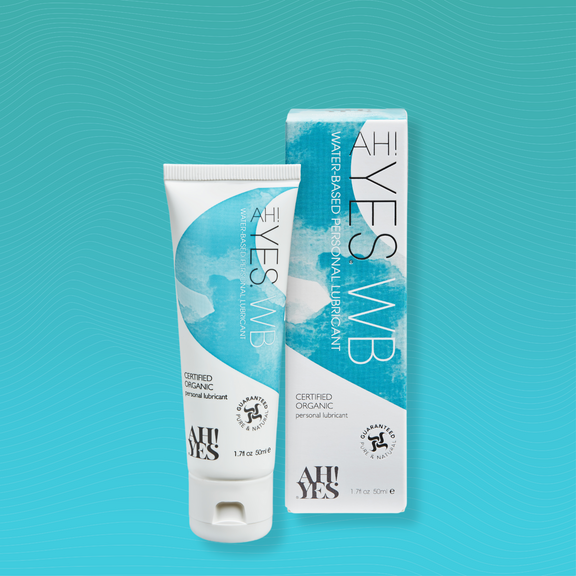What is lube and why should you use it? Our one stop guide to the wet and wonderful world of personal lubricant for pleasure
When searching for lube, most of us have one thing in mind: pleasure. Almost 70% of US women have used lube at some point in their lives [1]. And studies show that using it can significantly increase sexual pleasure and satisfaction [2]. But with so many options on the market, how do you know what lube Is right for you and your body and which ones are safe to use with condoms? Consider this your one stop guide to personal lubricant for pleasure!
What is lube?
Lube is a liquid or gel that is used during sex or masturbation to reduce friction, increase pleasure, and ease any discomfort. It can also reduce the risk of condom breakage and injury during sex.
It's important to note that not all lubes are made equal. The ingredients and formulation used will often determine how, when, and why you apply them. The base ingredients used in lubricant formulation mean that they fall into three main categories, explained later on.

What is the best lube for sex and what type of lubricant is safe to use with condoms?
Exploring different types of lube
- Water-based lube: condom friendly lubricant
Water-based lubricants are formulated with water as the main ingredient. They tend to feel the most natural and work quickly to ease dryness and discomfort. Water-based lubricants are likely to be condom compatible but it’s always best to check the label. AH! YES® WB, our organic water-based lube is compatible with natural rubber latex condoms and polyisoprene condoms. It can also be used with all toys: including metal, wooden, plastic, glass, and even silicone because our water-based products do not contain silicone or mineral oils. This makes it a great choice for solo pleasure!
- Silicone-based lube: usually compatible with latex condoms
Silicone-based lubes are common, and they are often marketed as lasting longer than water-based alternatives. They are usually compatible with latex condoms but should be avoided with silicone toys.
Our recommendation? Silicone lubricants are not absorbed or broken down by our body, so they do provide long-lasting lubrication, which often needs to be washed off after use for comfort and skin health. They cannot rehydrate dry tissues as they contain no water. They can, however, make a hydrophobic (water-hating) seal over the skin, so whilst they can lock in moisture, they can also lock in dirt and bacteria. This is why AH! YES® lubes will never contain silicone.
- Oil-based lube: usually not condom compatible
Oil-based lubes are great for extended play (partnered, solo, or otherwise!) This is because they last longer than the alternatives. They are usually water-resistant, so if shower sex is your thing, reach for an oil-based lube.
We believe the best oil-based lubes are made with natural oils such as coconut oil, shea butter, or almond oil. Be wary of synthetic ingredients, fragrances, glycerin, and parabens.
AH! YES® OB, our organic plant-oil-based lubricant is long-lasting and extremely soothing. Ideal if you are looking for a lube to nourish your delicate skin.
Oil-based lubes, including AH! YES® OB, cannot be used with latex rubber and are not condom compatible. Plant oils can erode material (especially latex) which can compromise the material integrity of the condom. Opt for water-based if you choose to wear condoms.
Choosing glycerin-free lube
Many vaginal moisturizers and lubricants contain glycerin. Unfortunately, glycerin can irritate and dehydrate vaginal tissue when used at concentrations above 20%. At even higher concentrations (>40%), glycerine can damage the tissues causing lesions and allow the transmission of STDs! If you are prone to UTIs or Thrush outbreaks, glycerin in a lubricant or vaginal moisturizer is a potential concern, as it has been shown to be a Candida nutrient with the potential to trigger Thrush outbreaks. In our experience, it’s best to avoid lubricants containing glycerin.
All AH! YES® lubricants and vaginal moisturizers are glycerin free.
Can you use coconut oil as lube?
Reaching for a coconut oil-based lube is no bad thing. Rummaging through your pantry or the cooking oil aisle of your local grocery store, however, is not recommended! The formulation, manufacturing, and quality of ingredients and preservatives used in coconut oil-based lubes are what keep them safe for use on your intimate parts. If you’re searching for a natural coconut-oil-based lubricant, AH! YES® COCO is made using organic coconut oil. It is richly nourishing, providing soothing relief for dry vulval and vaginal tissue.

How to apply lube before sex
Applying lube before sex is simple. Lubes tend to come in tubes which can be applied into your vagina, or onto the vulva using your fingers. They can also come in single-use applicators which are inserted directly into the vagina. You can also apply water-based lubricants onto condoms or compatible toys to make penetration more comfortable.
Having fun with lube; how to use lube for more pleasure
Smooth, silky, slippery, moist. When it comes to sex and intimacy, wetter really is better. Whatever the anatomy of you and your partner, experimenting with lube can bring an exciting dynamic to your intimate relationship.
Using oil-based lube during foreplay can help you experiment with touch and increase anticipation and relaxation. Why not practice your massage skills with AH! YES® OB? Its organic plant-based butters make it ideal to use as a massage oil! AH! YES® WB has no stickiness, taste, or smell so it’s great for oral sex and mutual masturbation.
Whatever your preferences, we strongly recommend; clothes off, lube on!

References:






